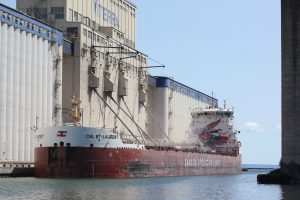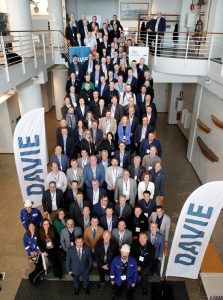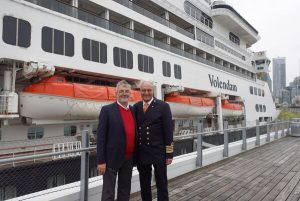South Korean shipbuilder Hyundai Samho Heavy Industries has taken the use of artificial intelligence in shipping another step forward by delivering the world’s first ship equipped with an AI-based engine automation system. The vessel is a 180,000-ton, LNG-powered bulk carrier delivered to H-Line.
“With the commercialization of this engine automation solution, we are one step closer to the era of the world’s first ‘unmanned ship’ in the field of large merchant ships that can operate for a long time without the help of a navigator, engineer, or deckhand,” Hyundai Samho Heavy Industries said in a statement.
The engine automation system, developed by HD Korea Shipbuilding & Marine Engineering, comprises an Integrated Condition Diagnosis Solution (HiCBM) and Integrated Safety Control Solution (HiCAMS). The systems work together to diagnose the condition of engine equipment in real-time and automatically recognize emergencies, such as a fire.
HiCBM uses AI to monitor and manage core ship equipment, such as main engines and power generation, compressors, and pumps in real-time. HiCAMS uses AI to detect and analyze safety-related events in real time using onboard CCTV.
Hyundai Samho Heavy Industries said the two systems can be applied to new vessels and ships currently in operation.
The safety and reliability of the two systems were verified by the American Bureau of Shipping (ABS) during the trial period last September of last year.
Hyundai Samho Heavy Industries is a subsidiary of HD Hyundai, formerly known as Hyundai Heavy Industries. Last June, another HD Hyundai affiliate, Avikus, claimed the world’s first trans-oceanic autonomous voyage of a large commercial ship. During that voyage, the LNG carrier Prism Courage sailed from Freeport, Texas to South Korea’s Boryeong LNG Terminal, via the Panama Canal, using Avikus’ HiNAS 2.0 technology. The latter uses AI for route and speed optimization, as well as collision avoidance. The 33-day voyage covered roughly 10,800 nautical miles, of which half was navigated autonomously.
“The advent of the era of autonomous ships based on artificial intelligence and digital technology is inevitable,” commented HD Korea Shipbuilding & Marine Engineering Executive Director Kwon Byeong-hu.
(Photo from HD Hyundai)






